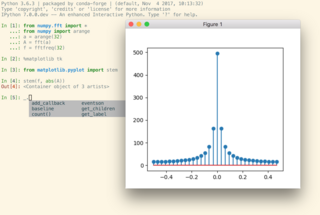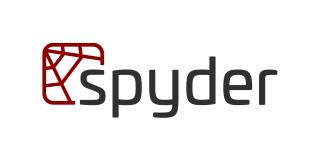Related Research Articles

LaTeX is a software system for typesetting documents. LaTeX markup describes the content and layout of the document, as opposed to the formatted text found in WYSIWYG word processors like Microsoft Word, LibreOffice Writer and Apple Pages. The writer uses markup tagging conventions to define the general structure of a document, to stylise text throughout a document, and to add citations and cross-references. A TeX distribution such as TeX Live or MiKTeX is used to produce an output file suitable for printing or digital distribution.
Adobe FrameMaker is a document processor designed for writing and editing large or complex documents, including structured documents. It was originally developed by Frame Technology Corporation, which was bought by Adobe.

In academic publishing, a preprint is a version of a scholarly or scientific paper that precedes formal peer review and publication in a peer-reviewed scholarly or scientific journal. The preprint may be available, often as a non-typeset version available free, before or after a paper is published in a journal.

LilyPond is a computer program and file format for music engraving. One of LilyPond's major goals is to produce scores that are engraved with traditional layout rules, reflecting the era when scores were engraved by hand.
Collaborative writing is a procedure in which two or more persons work together on a text of some kind. Success in collaborative writing involves a division of labor that apportions particular tasks to those with particular strengths: drafting, providing feedback, editing, sourcing, (reorganizing), optimizing for tone or house style, etc. Collaborative writing is characteristic of professional as well as educational settings, utilizing the expertise of those involved in the collaboration process.
This article provides basic comparisons for notable text editors. More feature details for text editors are available from the Category of text editor features and from the individual products' articles. This article may not be up-to-date or necessarily all-inclusive.

Markdown is a lightweight markup language for creating formatted text using a plain-text editor. John Gruber created Markdown in 2004, in collaboration with Aaron Swartz, as a markup language that is intended to be easy to read in its source code form. Markdown is widely used for blogging and instant messaging, and also used elsewhere in online forums, collaborative software, documentation pages, and readme files.
GenePattern is a freely available computational biology open-source software package originally created and developed at the Broad Institute for the analysis of genomic data. Designed to enable researchers to develop, capture, and reproduce genomic analysis methodologies, GenePattern was first released in 2004. GenePattern is currently developed at the University of California, San Diego.

IPython is a command shell for interactive computing in multiple programming languages, originally developed for the Python programming language, that offers introspection, rich media, shell syntax, tab completion, and history. IPython provides the following features:

Etherpad is an open-source, web-based collaborative real-time editor, allowing authors to simultaneously edit a text document, and see all of the participants' edits in real-time, with the ability to display each author's text in their own color. There is also a chat box in the sidebar to allow meta communication.

Spyder is an open-source cross-platform integrated development environment (IDE) for scientific programming in the Python language. Spyder integrates with a number of prominent packages in the scientific Python stack, including NumPy, SciPy, Matplotlib, pandas, IPython, SymPy and Cython, as well as other open-source software. It is released under the MIT license.

RStudio IDE is an integrated development environment for R, a programming language for statistical computing and graphics. It is available in two formats: RStudio Desktop is a regular desktop application while RStudio Server runs on a remote server and allows accessing RStudio using a web browser. The RStudio IDE is a product of Posit PBC.

Julia is a high-level, general-purpose dynamic programming language, most commonly used for numerical analysis and computational science. Distinctive aspects of Julia's design include a type system with parametric polymorphism and the use of multiple dispatch as a core programming paradigm, efficient garbage collection, and a just-in-time (JIT) compiler.

Plotly is a technical computing company headquartered in Montreal, Quebec, that develops online data analytics and visualization tools. Plotly provides online graphing, analytics, and statistics tools for individuals and collaboration, as well as scientific graphing libraries for Python, R, MATLAB, Perl, Julia, Arduino, JavaScript and REST.
LaTeXML is a free public domain software package which converts LaTeX documents to XML, HTML, EPUB, JATS and TEI.

CoCalc is a web-based cloud computing (SaaS) and course management platform for computational mathematics. It supports editing of Sage worksheets, LaTeX documents and Jupyter notebooks. CoCalc runs an Ubuntu Linux environment that can be interacted with through a terminal, additionally giving access to most of the capabilities of Linux.
Distributed Collaboration is a way of collaboration wherein participants, regardless of their location, work together to reach a certain goal. This usually entails use of increasingly popular cyberinfrastructure, such as emails, instant messaging and document sharing platforms to reduce the limitations of the users trying to work together from remote locations by overcoming physical barriers of geolocation and also to some extent, depending on the application used, the effects of working together in person. For example, a caller software that can be used to bring all collaborators into a single call-in for easier dissemination of ideas.

A notebook interface or computational notebook is a virtual notebook environment used for literate programming, a method of writing computer programs. Some notebooks are WYSIWYG environments including executable calculations embedded in formatted documents; others separate calculations and text into separate sections. Notebooks share some goals and features with spreadsheets and word processors but go beyond their limited data models.

Project Jupyter is a project to develop open-source software, open standards, and services for interactive computing across multiple programming languages.
References
- 1 2 3 4 Lomas, Natasha (2014-09-22). "Authorea Nabs $610k For Its Bid To Become A 'Google Docs For Scientists'". TechCrunch.
- 1 2 Wolff, Spencer (2014-09-09). "Authoring the Future". Huffington Post.
- 1 2 3 4 5 6 7 8 9 10 Perkel, Jeffrey (2014-10-01). "Scientific writing: the online cooperative". Nature. 514 (7520). Nature News: 127–128. Bibcode:2014Natur.514..127P. doi: 10.1038/514127a . PMID 25279924. S2CID 4452280.
- ↑ Nicholson, Josh; Pepe, Alberto; Server, Richard; Sussman, Linda; Inglis, John (2017-06-14). "Authorea and BioRxiv partner to bring preprints into 21st century". www.authorea.com. Authorea.
- ↑ "PREreview — a new resource for the collaborative review of preprints". eLife. 2017-10-25. Retrieved 2019-08-11.
- 1 2 3 Dale, Brady (2014-09-14). "This software for academic paper writing is inspired by Git". Technical.ly.
- ↑ Cantiello, Matteo (2014-09-14). "How to Bring Science Publishing into the 21st Century - A new collaborative tool could revolutionize scientific authorship". blogs.scientificamerican.com.
- 1 2 Stein, Gabe; Mankins, Matt (2013-08-30). "Can The GitHub For Science Convince Researchers To Open-Source Their Data?". FastCompany Labs.
- ↑ Kovalesky, Brian (2014-10-15). "Authorea wants to remake the academic collaboration process with its cloud-based platform for researchers and scholars". Startup Beat.
- ↑ "Authorea Raises $1.5M to Advance Open, Reproducible, Data-Driven Research | Newswire". www.newswire.com. Archived from the original on 2019-03-28.
- ↑ "Authorea buys VC-backed The Winnower - PE Hub". www.pehub.com. Archived from the original on 2017-09-02.
- ↑ "Authorea is acquired by Atypon and joins the Wiley family - Authorea".
- 1 2 3 4 5 Irving, Damien (2014-04-20). "Authorea: the future of scientific writing?". Dr Climate blog.
- 1 2 John, Otander (2013-03-07). "Writing papers with Authorea, batteries included". Astrobiased.
- 1 2 "A Collaborative Approach to Academic Papers: Authorea". Unveiled Web. 2014-01-22. Archived from the original on 2015-03-20. Retrieved 2015-03-12.
- ↑ Turnbull, Connor (2013-05-29). "Authorea: Simple Research Collaboration". AppStorm.
- 1 2 3 4 Graham, Jim (2014-10-02). "New Online Authoring Tools for Collaborative Manuscripts". SciMatic. Archived from the original on 2016-04-04. Retrieved 2015-03-03.
- 1 2 Joshua, Smith (2014-05-15). "Migrating a LaTeX manuscript hosted on GitHub to Authorea". Generic Surname Blog.